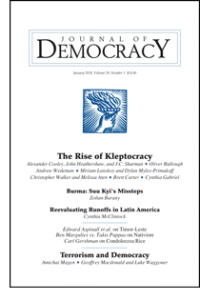
Credit: NY Times
There is little prospect of a Russo-American ‘grand bargain’ or rapprochement, even if Vladimir Putin visits Washington, in part because the US will not abandon democracy promotion, a RUSI analysis suggests:
Russia unsuccessfully pushed for an agreement to mutually refrain from interfering in each other’s politics; it continues to seek a pledge of the sort today. As an unnamed State Department official told BuzzFeed News: ‘We would have to give up democracy promotion in Russia, which we’re not willing to do’.
Russia’s is a “highly centralized authoritarian political system”, characterized by “widespread corruption at all levels and in all branches of government” and one of four states described as “morally reprehensible forces of instability” in the State Department’s yearly human rights report. The four countries – China, Iran, North Korea, and Russia – “violate the human rights of those within their borders on a daily basis,” Acting Secretary of State John Sullivan wrote in an introduction to the report.
 The West’s real enemy—and the enemy of the Russian people too—is a group of about 100 key beneficiaries of the Putin regime, and several thousand of their accomplices, many of whom hold posts in the Federal Security Service and the presidential administration, argues Mikhail Khodorkovsky (right), founder of Open Russia:
The West’s real enemy—and the enemy of the Russian people too—is a group of about 100 key beneficiaries of the Putin regime, and several thousand of their accomplices, many of whom hold posts in the Federal Security Service and the presidential administration, argues Mikhail Khodorkovsky (right), founder of Open Russia:
 Most of these people began their careers in the criminal underworld of St. Petersburg [as the late analyst Karen Dawisha demonstrated].. … Despite having now taken control of the presidency, the group retains every aspect of the criminal ilk from which they came. They are even conscious that they are a band of criminals whose goal is to steal money and avoid accountability by holding on to power.
Most of these people began their careers in the criminal underworld of St. Petersburg [as the late analyst Karen Dawisha demonstrated].. … Despite having now taken control of the presidency, the group retains every aspect of the criminal ilk from which they came. They are even conscious that they are a band of criminals whose goal is to steal money and avoid accountability by holding on to power.
“The best method of targeting Mr. Putin’s circle is to identify its individual members, along with their accomplices and the politicians they have paid off,” he writes for the Wall Street Journal. Using the Magnitsky Act, “the U.S. and its allies could act to cut them off from the mechanisms of their influence loot—the people, money, and corporations they control in the West.”
What makes Russia’s kleptocratic system so unique is how much cash is held offshore, according to economists Thomas Piketty, Filip Novokmet, and Gabriel Zucman. They estimate that nearly $1 trillion in Russian assets is held outside the country, likely by a handful of oligarchs, most of which doesn’t show up in official statistics, Christopher Matthews writes for Axios. This research shows that the average private citizen’s share of the national wealth has not increased whatsoever since the fall of the Soviet Union, despite the huge transfer of assets from the public sector to the private
 Trillions of dollars in capital flow into the United States annually but no one knows exactly whom the funds belong to, where they are held, or how they are deployed, since the U.S. government does not track the money, the Alliance for Securing Democracy’s Senior Fellow Joshua Kirschenbaum explains in Tracking Illicit Russian Finance Flows:
Trillions of dollars in capital flow into the United States annually but no one knows exactly whom the funds belong to, where they are held, or how they are deployed, since the U.S. government does not track the money, the Alliance for Securing Democracy’s Senior Fellow Joshua Kirschenbaum explains in Tracking Illicit Russian Finance Flows:
Starting next month, financial institutions will be required to identify the “beneficial owners” of new accounts under the Customer Due Diligence Rule. However, this addresses only one dimension of the “multi-faceted ways in which illicit funds can travel to or through the United States opaquely” and that “Painting a complete picture will require a comprehensive approach to mapping flows across bank deposits, portfolio investments, foreign direct investment, and real estate purchases.”
The Kremlin’s ostensible anti-corruption agenda masks efforts to expand federal control in the North Caucasus, argues Badma Biurchiev, a journalist for Kavpolit, who previously worked for Bolshoy Kavkaz and Caucasian Knot.. Due to the regime’s actions, “criminal entrepreneurship became legitimate and institutionalised in Dagestan,” while the “fusion of power and criminality was happening in other republics as well,” he writes for Open Democracy.
 Corruption was the reason Russia won the bid to host the 2018 World Cup, says former British premier David Cameron.
Corruption was the reason Russia won the bid to host the 2018 World Cup, says former British premier David Cameron.
As explored by Amanda Taub in Vox, Russia’s systemic corruption is so widespread, it leaves people little if any choice to pursue other options. If you want to secure any government-issued permit or if you want your small business to thrive, the system forces you into illegal means. At the same time, such actions technically remain illegal, so those in positions of power can, if they wish, swoop in at any time with legal action.
Kleptocracy is the focus of a special issue of the National Endowment for Democracy’s Journal of Democracy (left).







